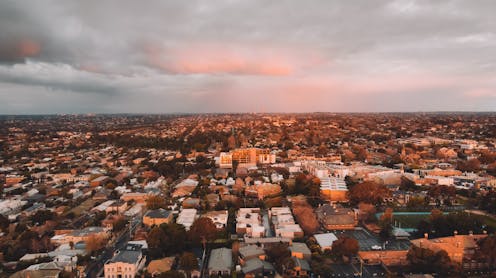What happens if I can't pay my mortgage and what are my options?
- Written by Andrew Grant, Senior Lecturer in Finance, University of Sydney

With rising costs of living, including interest rate rises, many people are really worried about their mortgage.
So, what actually happens if you can’t pay your mortgage – and what are your options?
Here’s what you need to know.
Read more: Vital signs: to fix Australia's housing affordability crisis, negative gearing must go[1]
Payment deferrals, payment plans or getting fees waived
It’s not particularly rare for a borrower to face a period of temporary financial hardship, often due to circumstances beyond their control.
Job loss[3], relationship breakdowns, natural disasters, injuries and illnesses all affect the capacity of householders to repay their loan, especially given mortgages tend to run over many years, if not decades.
Banks have “hardship” processes to deal with borrowers who are temporarily unable to repay their loan.
The Banking Code of Practice[4], to which most banks subscribe, provides guidelines for lenders to help consumers through financial difficulties.
One form of relief is a payment deferral or “holiday”. That’s where a customer is able to postpone repayments until the issue causing hardship is resolved. Many people used this option during COVID lockdowns.
However, a payment holiday sometimes simply “kicks the can down the road” and the customer is still in financial trouble when their temporary payment holiday ends.
Other options include payment plans. This is where you pay back less per month but the mortgage lasts longer overall.
Or, the bank may simply offer advice on how to handle finances until you’re back on your feet.
It is also possible for banks to waive discretionary fees (such as those related to overdue payments).
Banks don’t really want you to default
Banks typically do not want their customers to default on property.
They’re usually protected against losses themselves through lender’s mortgage insurance, but banks see mortgage holders as particularly valuable customers. They have shown they can obtain finance and repay loans.
Usually, it’s easier for the bank to make hardship arrangements with a customer - and build trust along the way - than it is to wind up a mortgage, seize the property and then have to deal with trying to sell it in a flagging market.
What about my credit score?
Recent changes[6] to the credit legislation make it easier to apply for a payment plan without affecting your credit score.
From July 1, 2022, under the terms of a financial hardship arrangement, a customer’s credit report will show they have made on time repayments for the period of the arrangement – providing they have followed the terms of the hardship agreement.
Credit reports will also indicate whether (but not why) a customer is in a financial hardship arrangement.
This information stays on a credit report for one year, then disappears.
Importantly, though, hardship information will be visible to other credit providers, and may affect a customer’s ability to get other loans during the period.
I’m struggling. So what should I do?
Contact your financial institution as early as you can. Your bank may be able to offer payment relief in the form of reduced payments or a holiday from repayments – or a combination of both.
You usually need to provide evidence for the reason for financial hardship, and there’s an expectation you’ll be able to resume repayments when the temporary issue is resolved.
Not every application for hardship will be successful, particularly if you have made promises to repay in the past and not followed through.
Income protection insurance[7] (for those who plan for uncertainties) may help prevent the need for hardship arrangements in the first place.
If you see the issue as ongoing, rather than temporary, consider a different approach.
If you’re ahead on your mortgage (as many Australians were during the pandemic), or you have significant equity in your house, consider refinancing. That’s where you take out a new mortgage to repay an existing loan.
You may be able to get a lower monthly repayment, especially if you have built an equity stake greater than 30%.
It won’t always be an option, especially if you are a recent borrower facing rising interest rates, stagnant or falling house prices, and have limited equity.
In dire circumstances, you may be able to access your superannuation early[9] (which means you may have a lot less to retire on).
If you really do need to sell, it is better to sell the property of your own volition, rather than having a forced sale.
Mortgagee-in-possession (which is where the bank sells the house) can often lead to a lower sales price than a vendor-led campaign, and the time frame may not suit you.
Free help is available. The Australian Retail Credit Association[10] provides information on how hardship processes are reported, while the Financial Rights Legal Centre[11] helps advocate for consumers through the mortgage stress process.
The government’s Moneysmart[12] site also provides information on how to navigate the hardship process.
Read more: The housing game has changed – interest rate hikes hurt more than before[13]
References
- ^ Vital signs: to fix Australia's housing affordability crisis, negative gearing must go (theconversation.com)
- ^ CC BY (creativecommons.org)
- ^ Job loss (www.rba.gov.au)
- ^ Banking Code of Practice (www.ausbanking.org.au)
- ^ CC BY (creativecommons.org)
- ^ changes (www.creditsmart.org.au)
- ^ Income protection insurance (moneysmart.gov.au)
- ^ CC BY (creativecommons.org)
- ^ access your superannuation early (www.ato.gov.au)
- ^ Australian Retail Credit Association (www.arca.asn.au)
- ^ Financial Rights Legal Centre (financialrights.org.au)
- ^ Moneysmart (moneysmart.gov.au)
- ^ The housing game has changed – interest rate hikes hurt more than before (theconversation.com)
Authors: Andrew Grant, Senior Lecturer in Finance, University of Sydney
Read more https://theconversation.com/what-happens-if-i-cant-pay-my-mortgage-and-what-are-my-options-188891













